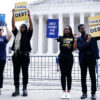
Leftist love for the Marxist Cuban regime manifests regularly. Just this Monday in the New York Times Marc Lacey had an item titled “Dreaming of Cuban Profits in Post-Embargo World.” The article was a bit odd, most notably for the unreal caption of a photo of tourists driving a 1952 Cadillac along El Malecón, describing the scene as “a pleasure that few Americans have experienced in decades.” The caption had a double meaning, as not only have Americans not visited El Malecón since the Revolution, but Americans haven’t experienced the pleasure of driving ancient automobiles because they have an open economy and a standard of living that allows them to buy new cars.
Much of the article explores the plans of political leaders like Senator Byron L. Dorgan (D-ND), who has proposed revocation of the ban on travel to Cuba. The Miami Herald reports that travel between the two states has begun to flourish as the possibility of the lift of a ban appears to be imminent. This must raise the hopes of many ex-patriots who have had a difficult time going back to visit their relatives, but such an action must also come with signs of liberalization on the part of Cuba.
Lacey’s post-embargo Cuba sure sounds wonderful, but it forgets about the actions that must first be taken by Cuba. While engagement by the United States was useful, the Soviet Union and China did not open thanks to American diplomacy alone. Actions taken by those countries’ respective leadership were key. Gorbachev engaged in a policy of glasnost (“openness”) that played an invaluable role in the dissolution of the Soviet empire. Chinese leader Deng Xiaoping opened his country to investment and the start of private competition (with countries like Singapore as a model). There’s little sign of such a shift in Cuba. While Cuban President Raul Castro has made signs of being willing to talk to the United States, those moves have been interfered with by Raul’s brother Fidel.
A freer Cuba would be beneficial to everyone. It is important, however, to remember that this is a transformation that can only happen through a change in Cuba’s policies, toward a more pluralist, democratic political system and more open economy. It is not a transformation that can happen simply through a change in our policies toward Cuba.
Michael Orion Powell is currently a member of the Young Leaders Program at the Heritage Foundation. His views do not necessarily reflect the views of the Foundation. For more information on interning at Heritage, please visit: http://www.heritage.org/About/Internships-Young-Leaders/The-Heritage-Foundation-Internship-Program


























